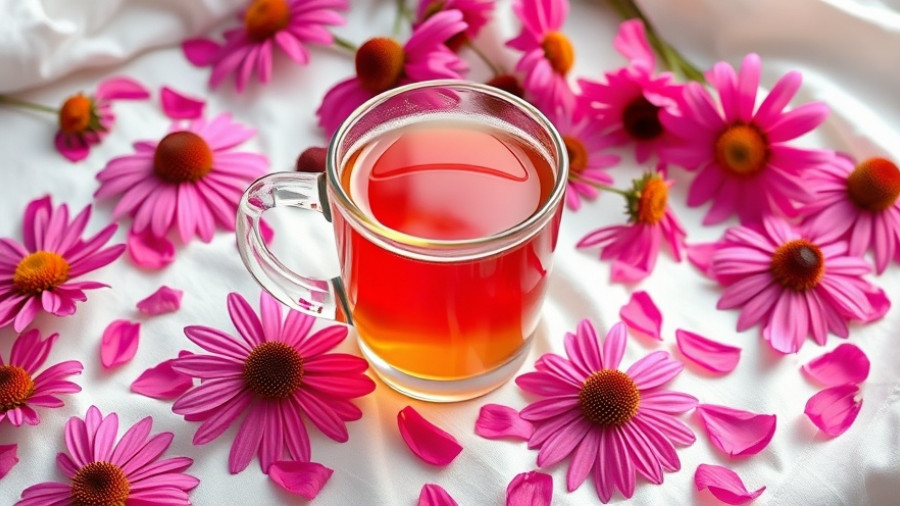
What is Echinacea Tea and Its Benefits?
Echinacea, often referred to as coneflower, is a flowering plant native to North America that is widely celebrated for its purported health benefits. For centuries, Indigenous tribes used this herb, and it has gained popularity as a natural remedy in modern herbal medicine. When brewed into a tea, echinacea offers a host of potential benefits, particularly in boosting the immune system's power to fight off ailments like the common cold and influenza.
Immune System Support: Your Body's Defender
One of the strongest appeals of echinacea tea lies in its ability to support the immune system. Research suggests that compounds in echinacea, such as polysaccharides and glycoproteins, stimulate the production of white blood cells. White blood cells play a crucial role in defending the body against infections, giving those who drink echinacea tea a helpful nudge in battling seasonal colds and flu symptoms.
The Antioxidant Superstars of Echinacea
Echinacea tea is high in antioxidants like cichoric acid and rosmarinic acid, which fight oxidative stress—an imbalance that can lead to chronic diseases. By drinking echinacea tea, you may help protect your cells from damage due to environmental stressors and improve overall health. The high antioxidant content is especially beneficial for heart health and reducing the risks of diseases like diabetes.
Diving Into Anxiety Relief
People facing everyday stress might find comfort in echinacea tea. Some studies indicate that this herbal remedy has properties that may alleviate anxiety and enhance emotional wellbeing. A recent study revealed that participants who took a specific echinacea extract reported reductions in anxiety symptoms. Therefore, sipping on this soothing tea could not only warm your body but also your mind, providing a moment of tranquility in a chaotic world.
Combating Inflammation: A Natural Solution
Echinacea boasts impressive anti-inflammatory properties, potentially helping to relieve conditions associated with prolonged inflammation, such as osteoarthritis. Research has shown that the herb can decrease inflammatory markers and promote healing, making it a valuable ally for anyone dealing with chronic pain or inflammation.
Supercharging Skin Health
Your skincare routine could benefit from echinacea tea, too! Topically applied extracts of this plant have been shown to improve hydration, reduce the appearance of wrinkles, and soothe conditions like eczema. When consumed as a tea, the antioxidants present can improve skin health from the inside out, potentially leading to a more youthful and vibrant complexion.
Research on Echinacea: Findings and Future Directions
While many studies support the benefits of echinacea, some research yields mixed results, especially concerning its effectiveness in shortening the duration of colds. Nonetheless, the popularity of echinacea remains steadfast, leading many to continue exploring its potential. Emerging studies even suggest echinacea may have antiviral effects against respiratory pathogens, including COVID-19, hinting at a promising future for this herbal remedy.
How to Brew Echinacea Tea at Home
Making echinacea tea at home is simple: boil water, add dried echinacea root or flowers, let steep for about five minutes, and enjoy! This natural beverage can be a soothing ritual, particularly during cold and flu season.
Known Side Effects and Precautions
Despite its many benefits, some might experience mild side effects, including gastrointestinal issues or allergic reactions. It's also crucial for individuals with autoimmune disorders or those on immunosuppressive medications to consult their healthcare provider before adding echinacea to their diet. As always, moderation is key—do not consume echinacea tea for extended periods without guidance.
Final Thoughts: Embracing Echinacea
The benefits of echinacea tea extend beyond just immune support; they reach into areas affecting mental health, skin vitality, and overall wellness. Whether you're looking to ward off seasonal sickness or explore a new, healthful drink option, echinacea tea is a worthy contender that combines Native American wisdom with contemporary health trends. As the body of research grows, many stay hopeful that echinacea will continue to reveal more about its powers for health and healing.
 Add Row
Add Row  Add
Add 




Write A Comment